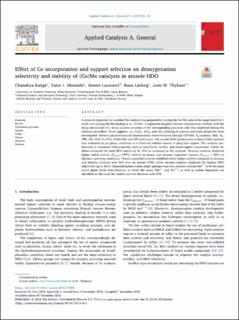| dc.contributor.author | Ranga, Chanakya | |
| dc.contributor.author | Alexiadis, Vaios I. | |
| dc.contributor.author | Lauwaert, Jeroen | |
| dc.contributor.author | Lødeng, Rune | |
| dc.contributor.author | Thybaut, Joris W. | |
| dc.date.accessioned | 2020-12-23T10:21:31Z | |
| dc.date.available | 2020-12-23T10:21:31Z | |
| dc.date.created | 2019-07-07T19:50:04Z | |
| dc.date.issued | 2019 | |
| dc.identifier.citation | Applied Catalysis A : General. 2019, 571 61-70. | en_US |
| dc.identifier.issn | 0926-860X | |
| dc.identifier.uri | https://hdl.handle.net/11250/2720916 | |
| dc.description.abstract | A series of supported Co modified Mo catalysts was prepared by varying the Co/Mo ratio in the range from 0 to 1 while maintaining the Mo loading at ca. 10 wt%. A sequential incipient wetness impregnation method, with Mo being introduced first, using aqueous solutions of the corresponding precursor salts was employed during the synthesis procedure. Three supports, i.e., Al2O3, ZrO2, and TiO2 differing in textural and acidic properties were investigated. Material physicochemical characteristics were evaluated through ICP-OES, N2-sorption, XRD, H2-TPR, NH3-TPD, O2-TPO, STEM-EDX and XPS techniques. The anisole HDO performance of these CoMo catalysts was evaluated at gas phase conditions in a fixed bed tubular reactor in plug flow regime. The catalysts performance is correlated with properties such as reducibility, acidity, and metal-support interactions. Cobalt addition enhanced the total HDO selectivity by 45% as compared to Mo catalysts. Alumina catalysts displayed higher initial activity (Xanisole≈97%) relative to titania and zirconia supported variants (Xanisole <40%) at identical operating conditions. Titania supported catalysts exhibited rather higher stability compared to zirconia and alumina catalysts over 50 h time on stream (TOS), while zirconia catalysts displayed the highest HDO selectivity (up to 86%). Characterization studies of pre and post-reaction catalysts indicate Mo5+ to be the main active phase while over-reduction to lower Mo states (Mo4+ and Mo3+) as well as carbon deposition are identified as the cause for catalyst activity decrease with TOS. | en_US |
| dc.language.iso | eng | en_US |
| dc.publisher | Elsevier | en_US |
| dc.rights | Attribution-NonCommercial-NoDerivatives 4.0 Internasjonal | * |
| dc.rights.uri | http://creativecommons.org/licenses/by-nc-nd/4.0/deed.no | * |
| dc.subject | Zirconia | en_US |
| dc.subject | Alumina | en_US |
| dc.subject | Titania | en_US |
| dc.subject | CoMo | en_US |
| dc.subject | Anisole | en_US |
| dc.subject | Hydrodeoxygenation | en_US |
| dc.subject | Bio-oil | en_US |
| dc.title | Effect of Co incorporation and support selection on deoxygenation selectivity and stability of (Co)Mo catalysts in anisole HDO | en_US |
| dc.type | Peer reviewed | en_US |
| dc.type | Journal article | en_US |
| dc.description.version | publishedVersion | en_US |
| dc.rights.holder | © 2018 The Authors. Published by Elsevier B.V. This is an open access article under the CC BY-NC-ND license (http://creativecommons.org/licenses/BY-NC-ND/4.0/).T | en_US |
| dc.source.pagenumber | 61-70 | en_US |
| dc.source.volume | 571 | en_US |
| dc.source.journal | Applied Catalysis A : General | en_US |
| dc.identifier.doi | 10.1016/j.apcata.2018.12.004 | |
| dc.identifier.cristin | 1710518 | |
| dc.relation.project | EC/FP7/604277 | en_US |
| dc.relation.project | EC/FP7/615456 | en_US |
| cristin.unitcode | 7401,80,40,0 | |
| cristin.unitname | Prosessteknologi | |
| cristin.ispublished | true | |
| cristin.fulltext | original | |
| cristin.qualitycode | 1 | |

